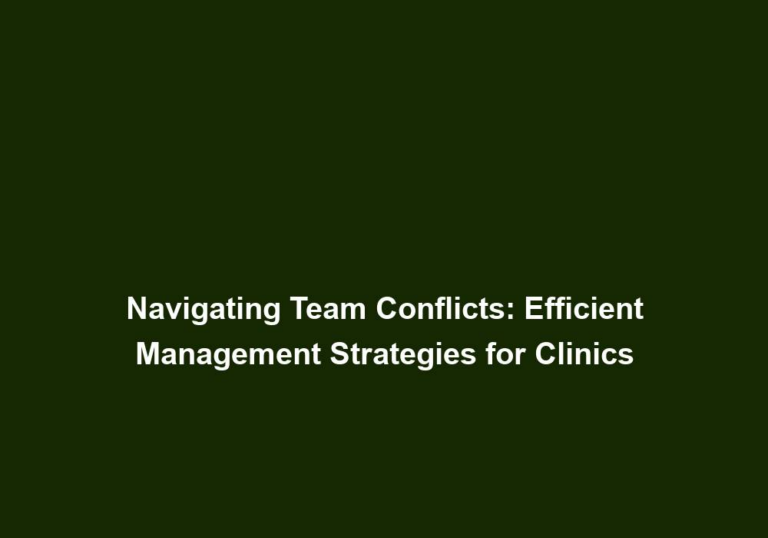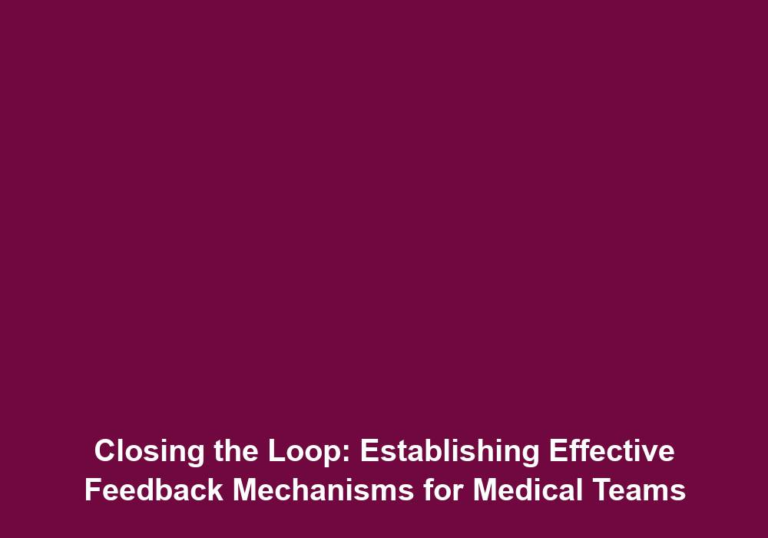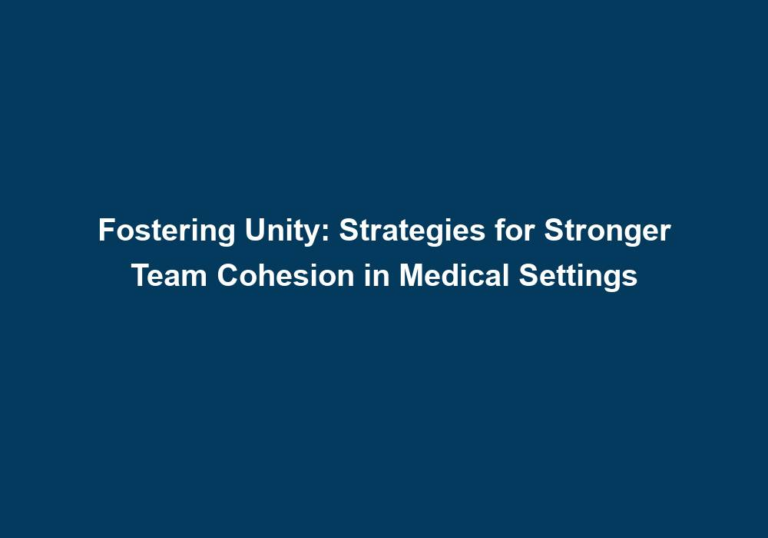Mastering Team Talk: Productive Communication in Healthcare Management
Effective communication plays a crucial role in the success of any organization, and this is particularly true in the field of healthcare management. As a healthcare manager, it is essential to master the art of team talk to ensure smooth operations, minimize errors, and promote collaboration among staff members. In this article, we will explore various strategies and techniques that can help healthcare managers enhance their communication skills and foster a productive work environment.
The Importance of Team Talk in Healthcare Management
In the fast-paced and high-stress environment of healthcare, effective communication can save lives. It is not just about transmitting information; it is about ensuring that the right information reaches the right people at the right time. Here are some key reasons why mastering team talk is essential in healthcare management:
-
Patient Safety: Clear and concise communication is critical to avoiding medical errors and ensuring patient safety. When healthcare professionals are able to communicate effectively, they can share vital information, discuss treatment plans, and coordinate care efficiently. This ultimately improves the quality of patient care and reduces the risk of adverse events.
-
Collaboration: Healthcare management involves a diverse range of professionals working together, including doctors, nurses, administrative staff, and support personnel. Effective team talk promotes collaboration by breaking down silos, encouraging interdisciplinary teamwork, and fostering a sense of unity among team members. Collaboration leads to improved patient outcomes, increased efficiency, and enhanced job satisfaction.
-
Efficiency: Efficient communication streamlines processes, reduces duplication of efforts, and minimizes delays. When everyone is on the same page, tasks can be executed more swiftly and accurately. This not only benefits patient care but also improves operational efficiency, allowing healthcare organizations to deliver services more effectively and optimize resource allocation.
-
Conflict Resolution: Miscommunication or lack of communication can lead to conflicts among team members. By mastering team talk, healthcare managers can facilitate conflict resolution, promote understanding, and maintain a harmonious work environment. Effective communication helps address differences of opinion, clarify expectations, and resolve conflicts in a timely manner, fostering a positive and supportive atmosphere.
Strategies for Mastering Team Talk
Now that we understand the importance of effective communication in healthcare management, let’s explore some strategies that can help healthcare managers enhance their team talk skills:
1. Clear and Concise Communication
Clear and concise communication is the cornerstone of effective team talk. Avoid using complex jargon or technical terms that may confuse team members. Instead, strive to convey information in a simple and understandable manner. Use clear language, provide context when necessary, and ensure that the message is received and understood by all recipients. Additionally, consider using visual aids, such as charts or diagrams, to enhance clarity and facilitate comprehension.
2. Active Listening
Effective team talk is a two-way process, and active listening is a crucial component. Encourage team members to express their thoughts, concerns, and ideas openly. Practice active listening by paying attention, maintaining eye contact, and providing feedback. This fosters a culture of open communication and makes team members feel valued, leading to increased engagement and collaboration. Remember to validate the speaker’s perspective and ask clarifying questions to ensure a complete understanding of their message.
3. Utilize Technology
In today’s digital age, there are various technological tools available to facilitate communication in healthcare management. Explore the use of secure messaging apps, collaborative platforms, and teleconferencing tools to enhance team talk. These tools enable real-time communication, instant sharing of information, and remote collaboration, bridging any geographical barriers that may exist within the organization. Additionally, consider implementing electronic medical records (EMRs) and other digital systems to streamline information sharing and improve accessibility.
4. Regular Team Meetings
Regular team meetings provide an opportunity for healthcare managers to ensure that everyone is on the same page and address any concerns or challenges. These meetings should be structured, focused, and inclusive. Encourage active participation, invite suggestions, and provide a platform for feedback. This not only promotes effective communication but also strengthens relationships and fosters a sense of belonging among team members. Consider using meeting agendas and minutes to keep discussions organized, track action items, and ensure follow-up on important matters.
5. Establish Clear Channels of Communication
Healthcare managers should establish clear channels of communication within the organization. This includes defining reporting structures, outlining lines of authority, and setting up appropriate protocols for communication. Clear channels eliminate confusion, reduce the chances of miscommunication, and ensure that important information reaches the relevant individuals in a timely manner. Consider implementing a centralized communication platform, such as a shared intranet or email system, to facilitate efficient and organized information exchange.
6. Develop Emotional Intelligence
Emotional intelligence is a vital skill for healthcare managers to master team talk. By understanding and managing their own emotions as well as empathizing with others, healthcare managers can create a supportive and trusting environment. This enables effective communication, resolves conflicts, and promotes collaboration within the team. Develop self-awareness, self-regulation, empathy, and social skills to foster positive relationships and cultivate a culture of open communication. Encourage team members to express their emotions constructively and provide support when needed.
Conclusion
In healthcare management, mastering team talk is imperative for ensuring patient safety, promoting collaboration, and enhancing overall efficiency. By employing strategies such as clear communication, active listening, and the use of technology, healthcare managers can create a productive work environment where effective communication thrives. Remember, effective team talk is not just about words; it is about fostering a culture of open communication, trust, and mutual respect among team members. Through continuous improvement and practice, healthcare managers can become proficient in team talk, leading to better outcomes for both patients and the organization.







